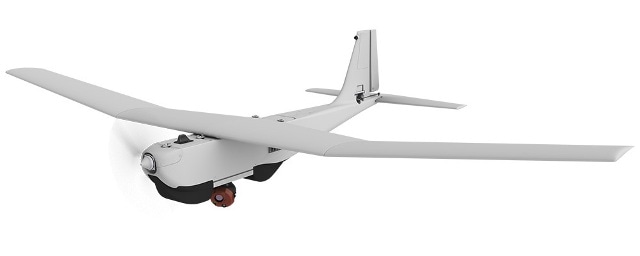May 4 2016
NASA, AeroVironment and SmartC2 Team for Beyond-Visual-Line-of-Sight Unmanned Aircraft System Traffic Management Flight Demonstration
- AeroVironment/SmartC2 solution meets requirements for a small unmanned aircraft system platform with beyond-visual line-of-sight (BVLOS) capabilities and UTM communications interface
- AeroVironment/SmartC2 team will help NASA prove technologies that support the development and approval of FAA requirements for safe flight and respectful integration of small UAS into the National Airspace
- Solution comprises AeroVironment’s FAA-certified RQ-20A Puma™ AE and SmartC2’s VirtualAirBoss™ operations infrastructure
 AeroVironment Puma™ AE and Smart C2 VirtualAirBoss™ to demonstrate beyond visual line of sight UAS traffic management with NASA (Photo: Business Wire)
AeroVironment Puma™ AE and Smart C2 VirtualAirBoss™ to demonstrate beyond visual line of sight UAS traffic management with NASA (Photo: Business Wire)
NEW ORLEANS (XPONENTIAL 2016), MAY 3, 2016 – AeroVironment, Inc. (NASDAQ: AVAV), a world leader in small unmanned aircraft systems (UAS), today announced that the company – in partnership with SmartC2, a leading provider of flight business management systems – will team with NASA on its Unmanned Traffic Management (UTM) Technology Capability Levels (TCL) 2 flight demonstration slated for October 2016.
The demonstration will build on results from UTM TCL1 field testing concluded last August and ongoing operational demonstration and field testing of AeroVironment’s FAA certified Puma™ AE small unmanned aircraft system to focus on beyond-visual line-of-sight operations in sparsely populated areas. Researchers will test technologies that allow dynamic adjustments to availability of airspace and contingency management, such as onboard autopilot 3D geo-fencing, enhanced safety with back-up data link command and control, and ADS-B integration communicating via the SmartC2 VirtualAirBoss™ aviation business management system into NASA’s UTM research platform.
NASA is working with the FAA and others to develop concepts and requirements for a UTM type construct to safely manage diverse UAS operations in the airspace above buildings and below traditional aircraft operations in suburban and urban areas.
The AeroVironment Puma AE (All Environment) small unmanned aircraft system delivers situational awareness directly to its operator in ground, riverine, and maritime operations and is capable of collecting data for terrain modeling, vegetation analysis and infrastructure management. Launched by hand and capable of landing on the ground or in fresh or salt water, Puma empowers its operator with a high degree of portability, 3.5 hours of flight time and operational flexibility for real-world missions in routine and extreme environments. Puma AE remains the only small unmanned aircraft system with FAA restricted type certification for commercial operations over American soil.
VirtualAirBoss is a comprehensive, browser-based, service-oriented-architecture (SOA) solution to help UAS service groups manage their business operations from end to end. The easy-to-use software system provides one central place where operators can schedule, plan, manage and report on their entire fleet and business processes.
“We are eager to build on our strong commercial UAS information solution and work with NASA and SmartC2 in this pivotal research, development and testing project to transform the way low-altitude airspace is managed,” said Kirk Flittie, vice president and general manager of AeroVironment’s Unmanned Aircraft Systems business segment. “Both companies bring powerfully relevant capabilities to deliver a critical enabler for emerging commercial UAS opportunities in the national airspace system.”
The AeroVironment/SmartC2 package supports NASA’s UTM TCL2 research platform for an integrated system capable of safely flying crossing trajectories that are separated by altitude in both line-of-sight and beyond-visual line-of-sight operations over sparsely populated areas with minimal structures on the ground. The VirtualAirBoss solution serves as the bridge between the Puma ground control station and the NASA UTM research server.
“The SmartC2 VirtualAirBoss will serve as the interface to the UTM research platform,” said Stuart Rudolph, SmartC2 chief executive officer. “The VirtualAirBoss open, SOA-based design incorporates a variety of current software tools, web services and methodologies that simplify communication with other systems, and can push and pull data with UTM Build 2 as appropriate.
“In other words, VirtualAirBoss will be used as the UTM ‘client’ for receiving data from the aircraft for pre-flight scheduling, in-flight positioning; and post-flight closeout. All of these data will be brokered through the VirtualAirBoss to the UTM TCL 2 research platform,” Rudolph said.
Puma’s asset and operational details will be captured organically in VirtualAirBoss, including all airframe identifying details, such as size, weight, style, model, registration, payload, speed parameters, endurance, control modes, launch/recovery methods, lost link capabilities and flight history. These asset and operational details, along with personnel qualifications, availability and certifications, will be available to authorized users of VirtualAirBoss, and are easily included in any required or requested reports.
During the UTM TCL2 demonstration, position reporting will be required of all UAS operations within the airspace and a public portal will inform general aviation, hobbyists and the public about relevant UAS commercial operations.
“AeroVironment and SmartC2 are eager to support NASA and the FAA with proven, reliable technologies that will speed the development of beyond-line-of-sight standards and requirements to enable the safe integration of UAS into U.S. national airspace. UAS operating beyond-line-of-sight will bring transformational capabilities to utilities, agriculture, oil and gas, railroads and other industries with large areas and long distances to monitor and manage,” Flittie said.